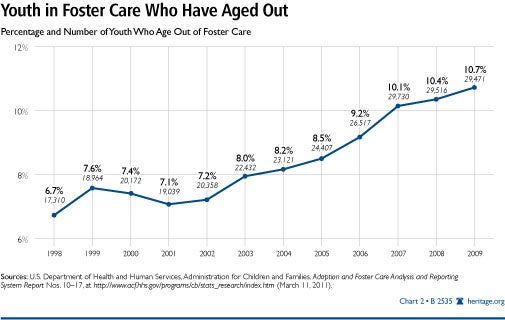This week, nearly 100 policymakers, practitioners, and administrators met in Washington, D.C., to discuss new solutions for the complex issue of poverty.
Among the topics discussed was the nation’s foster care and adoption system. Roughly 400,000 children languish in today’s system, in which they will likely experience multiple, periodic placements in foster homes. These children are at a much higher risk of poverty and homelessness.
Nearly 30,000 foster children “age out” of the system each year at age 18, never having experienced life in a stable “forever family.” They have no homes to return to for the holidays or in times when support and love are needed. (continues below chart)
With foster care and adoption, as well as a spectrum of other vitally needed services, policy reform should be coupled with recognition and support for the nation’s vast array of civic organizations and community grassroots organizations.
In New Jersey, for example, the Harvest of Hope program, launched by Pastor DeForest “Buster” Soaries and his congregation of the First Baptist Church at Lincoln Gardens in New Jersey, has partnered with other churches in an effort to assist foster children. Its success has far outpaced that of government agencies in finding permanent homes for children.
Soaries’s initiative has recruited 400 African-American families to serve as licensed foster care homes, placed 800 children in foster care, and coordinated adoptions for 260 children.
Another topic on the summit’s agenda was the promotion of healthy marriages and strong families, the institutions that provide the foundation for individual and community health and development. Not only is marriage the key defense against childhood poverty, but the intact family promotes child well-being on a variety of fronts, from academic success to a reduced risk of self-destructive and risky behavior to lower psychological distress.
While much can be done in the policy arena to reduce disincentives to marriage and promote strong families, the personal investment and long-term guidance that is needed to encourage and strengthen marriage lies beyond the domain of government and in the arena of civil society.
Among the presenters at the recent summit was Pastor Shirley Holloway, whose House of Help/City of Hope ministry has empowered thousands of addicts and alcoholics to reclaim and renew their lives and build thriving marriages and families. There are now more than 100 married couples among the graduates of Holloway’s program. Many have gone from homelessness to homeownership.
Holloway explained that she made every effort to ensure that those couples took time to prepare themselves to become reliable spouses before they entered into the commitment of marriage, and she provided access to resources ranging from training in financial planning and management to guidance in conflict resolution. “I even have folks who have never been addicted or been in trouble with the law come to me for marriage guidance,” she said.
Empowering the poor to escape dependency and achieve self-sufficiency and fulfilling lives entails innovative principle-based, outcome-focused public policy as well as recognition and support for the unique resources that exist in civil society.
While government may be able to provide temporary material support for those with nowhere else to turn, the poverty problem in America is much more complex than that. The relational work of civil society exemplified by organizations such as Soaries’s and Holloway’s, along with many others, can have dramatic effects on serving and empowering those in need.































